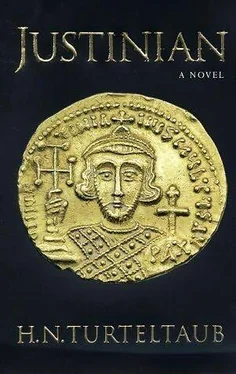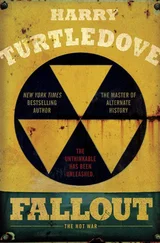Harry Turtledove - Justinian
Здесь есть возможность читать онлайн «Harry Turtledove - Justinian» весь текст электронной книги совершенно бесплатно (целиком полную версию без сокращений). В некоторых случаях можно слушать аудио, скачать через торрент в формате fb2 и присутствует краткое содержание. Жанр: Историческая проза, на английском языке. Описание произведения, (предисловие) а так же отзывы посетителей доступны на портале библиотеки ЛибКат.
- Название:Justinian
- Автор:
- Жанр:
- Год:неизвестен
- ISBN:нет данных
- Рейтинг книги:3 / 5. Голосов: 1
-
Избранное:Добавить в избранное
- Отзывы:
-
Ваша оценка:
- 60
- 1
- 2
- 3
- 4
- 5
Justinian: краткое содержание, описание и аннотация
Предлагаем к чтению аннотацию, описание, краткое содержание или предисловие (зависит от того, что написал сам автор книги «Justinian»). Если вы не нашли необходимую информацию о книге — напишите в комментариях, мы постараемся отыскать её.
Justinian — читать онлайн бесплатно полную книгу (весь текст) целиком
Ниже представлен текст книги, разбитый по страницам. Система сохранения места последней прочитанной страницы, позволяет с удобством читать онлайн бесплатно книгу «Justinian», без необходимости каждый раз заново искать на чём Вы остановились. Поставьте закладку, и сможете в любой момент перейти на страницу, на которой закончили чтение.
Интервал:
Закладка:
I do not think he knew he was dying. Because of the drug, he had no clear notion of time. Once he exclaimed in surprise that suddenly it was night, when a moment before the sun had been shining into the bedchamber. The hours between simply did not exist for him.
Not long before the end, he looked at me and said, "High time we found a girl for you, Justinian. By your age, I'd already married your mother."
"Yes, Father," I said. He surely knew I was no virgin: he wanted me to have a wife. Though I seemed obedient, the idea of being limited to one woman did not appeal to me. Still, he was right: for the sake of the dynasty, I needed an heir, and a legitimate one. And even had he been wrong, who would contradict a man on what was plainly his deathbed?
Someone- I do not know who- perhaps my mother, perhaps Peter, perhaps Stephen the Persian or some other palace functionary- summoned George the ecumenical patriarch to administer the sacrament of unction to my father. George looked in need of unction himself; his own health was visibly failing. My father did not wake while the patriarch anointed him and prayed for the forgiveness of his sins.
He roused a little while afterwards. His eyes found mine. He inhaled once, deeply. I thought he was going to tell me something. Ever so slowly, his breath sighed out. His eyes stayed open. When I moved, they did not follow me. I gestured to Peter. He felt for a pulse, then let the wrist drop, limp. First the right, then the left, he closed my father's eyes.
MYAKES
After Herakleios, none of that dynasty lived to grow old. They didn't last long, but God and all the saints, they burned hot while they were here.
Strange to think about it, Brother Elpidios, but, do you know, Constantine could be alive today. He'd be eighty, more or less: a great age, aye, but not an impossible one. He was a fine man while he lived, maybe even a great one when you remember all he did while he ruled.
And he's been gone these past forty-five years and more, and who thinks about him today? You and me inside this monastery, and nobody else in the whole wide world. That's what fame in the world is worth. Peace with the Lord is better. Or maybe having some fun in the world and then peace with the Lord.
Oh, don't click your tongue between your teeth at me, Brother. Weren't you the one who was asking questions about women and-? All right, I'll not go on, not if you say it upsets you. It didn't upset you then. It-
Yes, Brother. Constantine. A fine man, as I say, and a pious man, a good Christian. Yes, if he'd lived longer, he might have tried holding the Empire on a more peaceful course. But he didn't live longer. That left it up to Justinian. He had his own ideas about things and, now, no one to tell him no.
JUSTINIAN
My father's washed and anointed body lay in state in the throne room for two days. He faced east, as is the custom, his arms formed in the sign of the cross on his chest, a holy icon in his right hand. Candles and incense burned to either side of him. My mother and I spent most of our time there, lamenting, while nobles and clergy and soldiers and common people filed past to look on him one last time and to mourn with us.
We laid him to rest in the church of the Holy Apostles; he being the Emperor, no other choice was conceivable. For the second time in little more than half a year, my mother and I, dressed in black, paraded through the streets of the God-guarded and imperial city to lay our nearest kin to rest.
My father's body, still dressed in imperial robes as it had been while it lay in state, rested in a wooden coffin on a black-painted cart drawn by a pair of lowing oxen. Excubitores in black surcoats, their spears fixed with black streamers, marched to either side of the cart. Behind my mother and me came a great crowd of nobles and palace servants, all of them crying out their grief that the lord of the inhabited world, the vicegerent of God on earth, was dead.
The people of Constantinople lined the Mese and packed the squares of the city to bid my father a last farewell. "What will we do without Constantine?" my mother shrieked, over and over again.
I set my hand on her shoulder. "I will care for the Empire now," I said, "and care for you as well."
She shook me off. "I pray to God you make a good Emperor, as you are a good son," she said, "but you are not my husband, nor can you be." She was far from an old woman, and I, at thoughtless sixteen, did not understand how much of her life had come to an end along with my father's.
Past the church of St. Euphemia, through the Forum of Constantine, and through the Forum of Theodosios the funeral procession made its slow, sorrowful way. Then we proceeded northwest up the Mese toward the Kharisian Gate, past the church of St. Polyeuktos- after the church of the Holy Wisdom, perhaps the grandest in the city- past the column of the Emperor Markianos on the opposite side of the thoroughfare, and on to the church of the Holy Apostles, less than a bowshot from the remnants of the first inadequate wall Constantine the Great had built for the new Rome that came to bear his name.
The church of the Holy Apostles resembles that of St. John in Ephesos, being of cruciform plan with five domes. The excubitores lifted my father's coffin down from the cart and carried it into the church. The mosaic on the floor of the narthex showed Constantine the Great offering the basilica to Christ. My mother and I both crossed ourselves as we walked over the mosaic and into the church itself.
After setting the coffin on a stand next to the altar, the excubitores withdrew. My mother went up into the women's gallery, whence she could gaze down on my father, or the mortal part of him, for the last time. George the patriarch prayed for my father's soul, as he had for that of my brother, and also prayed for the Roman Empire, as is usual when an Emperor passes from men.
"We are fortunate," he said in a slow voice that put me in mind of nothing so much as a tired man scuffing through dry leaves (plainly his patriarchate would not long outlast my father's reign), "we are fortunate, I say, that Constantine, who must now sit at the right hand of God, left behind for us a successor who, being just now arrived at the first flush of manhood, will surely rule for many long and prosperous years."
I stood straighter. Till then, I had been so consumed with my father's passing and with readying his funeral, I had not thought ahead to what would be my reign. Now I did, just for a moment. My father had not run the Roman Empire as I would have, nor had he heeded me when I told him as much. The power had been his. Now it was mine. I could make changes. I would make changes- soon.
George having finished celebrating the liturgy, my mother came back down to the main level of the church. The excubitores returned and, lifting the coffin, carried it down the marble stairs to the mausoleum below. I followed, as did my mother and George. The ecumenical patriarch had trouble going downstairs; after a moment, a priest hurried up to lend him support.
Despite torches and candles and lamps, the air in the mausoleum was cool and rather damp. I went from one sarcophagus to another, reading the great names: the first Constantine; the first Theodosios, who beat the last pagan army in the west and ended the Olympic games; the second Theodosios, who erected the walls fortifying Constantinople to this day; the Justinian for whom I was named; and my great-great-grandfather, Herakleios. My father would rest in worthy company.
The excubitores set down the coffin that had borne my father from the great palace to the church of the Holy Apostles. They lifted his remains from the coffin and placed him in the stone sarcophagus that awaited him. When they set the lid on the sarcophagus, my mother wailed anew.
Читать дальшеИнтервал:
Закладка:
Похожие книги на «Justinian»
Представляем Вашему вниманию похожие книги на «Justinian» списком для выбора. Мы отобрали схожую по названию и смыслу литературу в надежде предоставить читателям больше вариантов отыскать новые, интересные, ещё непрочитанные произведения.
Обсуждение, отзывы о книге «Justinian» и просто собственные мнения читателей. Оставьте ваши комментарии, напишите, что Вы думаете о произведении, его смысле или главных героях. Укажите что конкретно понравилось, а что нет, и почему Вы так считаете.












